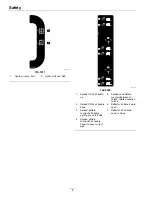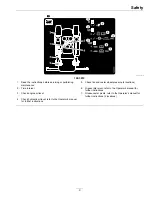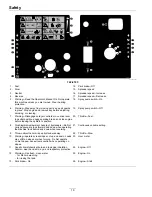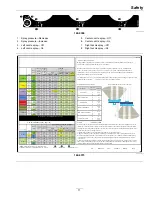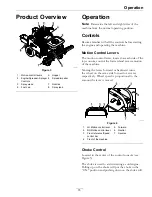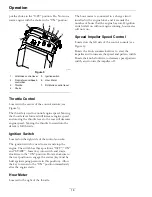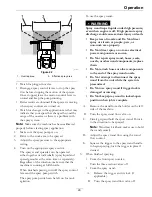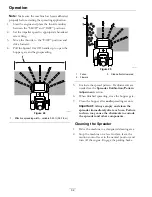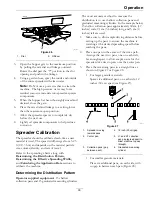
Operation
CAUTION
Refueling engine is difficult especially when
using a larger refueling container (5 gal (19 L)).
When refueling, it is recommended to:
•
Use a smaller container—1-2 gal (4-8 L).
•
Use a funnel.
•
In certain conditions during fueling, static
electricity can be released causing a spark which
can ignite gasoline vapors.
– Do Not fill containers inside a vehicle or on a
truck or trailer bed with a plastic liner. Always
place containers on the ground and away from
your vehicle before filling.
– When practical, remove gas-powered
equipment from the truck or trailer and
refuel the equipment with its wheels on the
ground. If this is not possible, then refuel
such equipment on a truck or trailer from a
portable container, rather than from a gasoline
dispenser nozzle.
– If a gasoline dispenser nozzle is used, keep the
nozzle in contact with the rim of the fuel tank
or container opening at all times until fueling
is complete. Do Not use a nozzle lock open
device.
•
Do Not overfill the fuel tank. Fill the fuel tank to
the bottom of the filler neck. The empty space in
the tank allows gasoline to expand. Overfilling
may result in fuel leakage or damage to the engine
or emission system.
•
Gasoline is harmful or fatal if swallowed.
Long-term exposure to vapors may cause serious
injury and illness.
– Avoid prolonged breathing of vapors.
– Keep face away from nozzle and gas
tank/container opening.
– Keep away from eyes and skin.
•
To help prevent fires:
– Keep engine and engine area free from
accumulation of grass, leaves, excessive grease
or oil, and other debris which can accumulate
in these areas.
– Clean up oil and fuel spills and remove fuel
soaked debris.
– Allow the machine to cool before storing the
machine in any enclosure. Do Not store the
machine or fuel container, or refuel, where
there is an open flame, spark, or pilot light
such as on a water heater or other appliance.
Operating Instructions
During Operation Safety
General Safety
The operator must use their full attention when
operating the machine.
Do Not
engage in any activity
that causes distractions; otherwise, injury or property
damage may occur.
WARNING
Operating engine parts, especially the muffler,
become extremely hot. Severe burns can occur
on contact and debris, such as leaves, grass,
brush, etc. can catch fire.
Clean the machine as stated in the Maintenance
section. Keep engine and engine area free from
accumulation of grass, leaves, excessive grease
or oil, and other debris which can accumulate
in these areas.
CAUTION
Chemicals are hazardous and can cause personal
injury.
•
Read the directions on the chemical labels
before handling the chemicals and follow
all manufacturer recommendations and
precautions.
•
Keep chemicals away from your skin.
Should contact occur, wash the affected area
thoroughly with soap and clean water.
•
Wear goggles, gloves, and any other protective
equipment recommended by the chemical
manufacturer.
•
Operate the engine only in well-ventilated areas.
Exhaust gases contain carbon monoxide, which is
an odorless deadly poison.
•
Do Not operate the machine while ill, tired, or
under the influence of alcohol or drugs.
•
Operate the machine only in good visibility and
appropriate weather conditions. Do Not operate
the machine when there is the risk of lightning.
22
Summary of Contents for Z-SPRAY JUNIOR Series
Page 1: ...Z SPRAY JUNIOR SERIES For Serial Nos 411 294 212 Higher Part No 4505 818 Rev A...
Page 60: ...Notes 60...
Page 61: ...Notes 61...
Page 62: ...Service Record Date Description of Work Done Service Done By 62...
Page 63: ...63...

